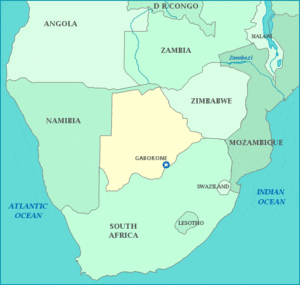Although Botswana’s energy requirements are dominated by petrol fuels, the country does not have any petrol reserves and has to import all required petroleum in refined form from neighbouring South Africa.
In addition, the country does not have connections to regional petroleum pipes and thus is totally dependent on South Arica in terms of supply and logistics. It is vital that Botswana secures a more cost-effective alternative fuel supply and one of the proposed solutions is that the Government establishes a state owned Oil Company. An investigation into the feasibility of this solution is currently underway. Pricing of Petroleum ProductsThe Ministry of Minerals, Energy and Water Resources (MMEWWR) coordinates the operation of the oil industry. They regulate fuel price stability through monitoring and monthly setting of petroleum prices while at the same time ensuring that the oil industry remains profitable and sustainable. A price build up is based on assumed landed cost. Landed costs refer to the total cost of shipped product, which includes the purchase price, freight, insurance and any other costs up to the port destination. Any international oil price change directly impacts Botswana fuel prices. Given the fall in oil prices since the beginning of the year, the MMEWWR decided to reduce the Pump fuel price by 1 Pula on all petrol products on 6 April 2015. The current petrol price is P7.96 and the current diesel price is P8.05. Fuel Demand
A study from the Department of Energy in 2007 predicts that the current fuel demand in cubic meters on both petrol and diesel will increase by 44% from 2015 to the end of 2025. The annual increase is based on the GDP growth rate of 6% per annum. The main suppliers of fuel in the country are as follows: • Shell
• Engen
• BP
• Caltex
• CFP total
• Sasol It is interesting to note that the government has ensured adequate fuel storage facilities for the various suppliers to ensure adequate supply and to eliminate price fluctuations based on shortage.
Diesel is clearly subsidised by the Botswana government – although Botswana imports its entire refined diesel, it is still cheaper than South African diesel which supplies the fuel.
Similarly, it is apparent that petrol is also subsidised by the government. The significant drop in the fuel price is largely due to:- The focus by OPEC producing countries on increasing their market share
- Slow and deteriorating EU economies and the slowing of Asian economies, leading to a significant reduction in demand levels
- Significant growth in the U.S. domestic crude oil production
However, a factor in Botswana’s favour is the strength of its currency. The Botswana Pula is currently significantly stronger than the South Africa Rand (1U$/9.6637 BWP) (1U$/11.8216 ZAR) which results in reduced fuel prices for fuel imported from SA. Additionally, the Pula has been reasonably steady against the dollar, showing only a 17% depreciation in the past two years. The Future
Given the current situation, and taking into account the Brent Crude Oil predictions and currency exchange factors, Eqstra anticipates that the Botswana fuel price will increase between 6 – 7% until December 2015. It therefore, recommends that an annual inflation of at least 7% is budgeted for fuel in 2015. The company further recommends a review of your fleet mix and operational costs at least every two years to ensure you optimise cost and efficiency within your fleet.







